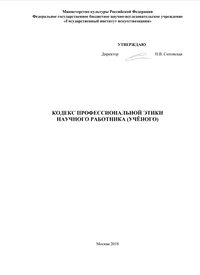
Language: English
Code of Conduct for Scientists in the Life Sciences
[Code of Conduct for Scientists]
This code of conduct outlines the ideal ethical values, norms of behavior, and principles of members of the scientific community.
SUMMARY
This code of conduct outlines the ideal ethical values, norms of behavior, and principles of members of the scientific community. In the life sciences, codes of conduct can be valuable tools for promoting transparency around dual use issues, enforcing professional standards, and defining appropriate responses to professional concerns. This code of conduct outlines the basic ethical principles of scientific activity, the rights and obligations of scientists, general standards regarding scientific activity, the role of heads of research teams, scientific publication standards, and an overview of violations of scientific ethics.
This code of conduct is based on existing legislation within and was created by the Russian Federation. This code of conduct also draws upon the norms of scientific ethics adopted by the Max Plank Society, an independent association of German research institutes. While the code is intended for Russian audiences, this resource may be useful for a wide variety of scientific audiences attempting to structure their own code of conduct. For instance, a similar but not identical code of conduct is used within the Republic of Tajikistan. This code addresses biosafety awareness, citizen scientists, and conflicts of interest in addition to the basic ethical obligations and rights of members of the scientific community. Both codes of conduct are only available in Russian as of January 2022.

..png)
